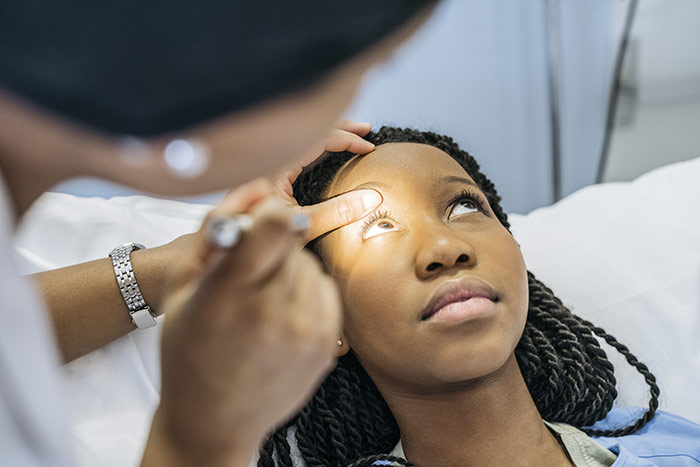
Vision Rehab for TBI & Stroke
VISION REHABILITATION FOR CONDITIONS INCLUDING TRAUMATIC BRAIN INJURY AND STROKE
Devastating visual problems can result from traumatic brain injury such as a concussion or stroke, or diseases such as multiple sclerosis (MS), cerebral palsy (CP), or chronic traumatic encephalopathy (CTE).
Studies show that over 50% of brain pathways related to visual function. Therefore, it is not surprising that those suffering from a TBI often experience one or more visual symptoms.
Our Goal is to Help You Return to You!
WHAT IS A TRAUMATIC BRAIN INJURY (TBI)/ CONCUSSION?
The Centers for Disease Control and Prevention defines a traumatic brain injury (TBI) as a disruption in the normal function of the brain that can be caused by a bump, blow, or jolt to the head, or penetrating head injury. Everyone is at risk for a TBI, especially children and older adults. In the United States, an estimated 1.7 million people sustain a TBI each year with about 75 percent of them a result of concussions or other forms of mild traumatic brain injury.
Visual problems are often overlooked during initial treatment of a brain injury and in some cases, symptoms may not be present until sometime after the injury. Left untreated, visual system disorders can have serious consequences. If you notice any changes in your vision following a concussion or some other head trauma, don’t ignore them: Immediately contact us.
Early diagnosis leads to appropriate treatment.
REHABILITATIVE VISION THERAPY SUCCESS STORIES
Amazing Progress Through Vision Therapy with Photolight Therapy Following Brain Injury
When I first arranged an appointment at Hellerstein & Brenner, it was already 5 months after my brain injury occurred. In January, a ski lift chair had hit me from behind and knocked me down backwards. My head hurt, but I wore a helmet and the pain diminished. I was able to ski the rest of the day. [...]
VISUAL SYMPTOMS ASSOCIATED WITH TBI/CONCUSSION
- Light and Visual Sensitivity
- Reduced Eye Teaming Ability (such as Convergence Insufficiency)
- Reduced Tracking Ability
- Poor Focusing
- Deficits in Visual Information Processing and Perception
- Visual/Brain “Fog”
- Changes in Balance
- Difficulty with Central-Peripheral Integration
- Spatial disorientation
- Double vision (Diplopia)
- Reduced/delayed vision memory
- Blurred vision
- Difficulty with reading, Loss of place while reading
- Headaches
- Eyes strain/fatigue
- Problems accurately gauging movement, direction, and speed
- Eye-hand coordination
- Motor integration difficulties
- Nausea, dizziness, vertigo
- Poor concentration
- Inability to tolerate crowded or busy places
- Light and Visual Sensitivity
- Reduced Eye Teaming Ability (such as Convergence Insufficiency)
- Reduced Tracking Ability
- Poor Focusing
- Deficits in Visual Information Processing and Perception
- Visual/Brain “Fog”
- Changes in Balance
- Difficulty with Central-Peripheral Integration
- Spatial disorientation
- Double vision (Diplopia)
- Reduced/delayed vision memory
- Blurred vision
- Difficulty with reading, Loss of place while reading
- Headaches
- Eyes strain/fatigue
- Problems accurately gauging movement, direction, and speed
- Eye-hand coordination
- Motor integration difficulties
- Nausea, dizziness, vertigo
- Poor concentration
- Inability to tolerate crowded or busy places
COMMON VISUAL DIAGNOSES ASSOCIATED WITH TBI/CONCUSSION?
- Convergence Insufficiency
- Binocular Dysfunction
- Oculomotor Dysfunction
- Accommodative Dysfunction
- Convergence Excess
- Visual Midline Shift
- Visual Perceptual/Processing Disorder
- Visual-Vestibular Integration Dysfunction

Our goal is to help you return to you!
Vision Rehabilitation can effectively treat the visual consequences of brain trauma.
